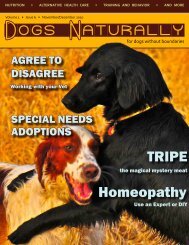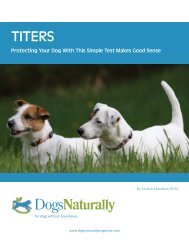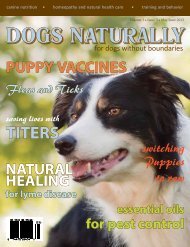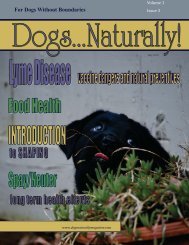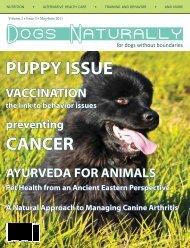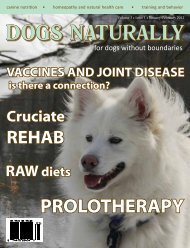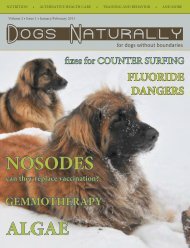For Dogs Without Boundaries - Dogs Naturally Magazine
For Dogs Without Boundaries - Dogs Naturally Magazine
For Dogs Without Boundaries - Dogs Naturally Magazine
You also want an ePaper? Increase the reach of your titles
YUMPU automatically turns print PDFs into web optimized ePapers that Google loves.
Don Hamilton DVM<br />
Vaccinations<br />
in Veterinary Medicine<br />
A practice that was started many years ago and that lacks scientific validity or verification is<br />
annual re-vaccinations. Almost without exception there is no immunologic requirement for<br />
annual revaccinations. Immunity to viruses persists for years or for the life of the animal. Successful<br />
vaccination to most bacterial pathogens produces an immunologic memory that remains<br />
for years, allowing an animal to develop a protective anamnestic (secondary) response<br />
when exposed to virulent organisms. Only the immune response to toxins requires boosters<br />
(e.g. tetanus toxin booster, in humans, is recommended once every 7-10 years). And no toxin<br />
vaccines are currently used for dogs and cats. Furthermore, revaccination with most viral vaccines<br />
fails to stimulate an anamnestic (secondary) response as a result of interference by existing<br />
antibody (similar to maternal antibody interference). The practice of annual vaccination<br />
in our opinion should be considered of questionable efficacy unless it is used as a mechanism to<br />
provide an annual physical examination or is required by law (i.e., certain states require annual<br />
revaccination for rabies).<br />
Summary: Yearly "boosters" are unnecessary, provide<br />
no benefit if given (will not increase immunity). Thus<br />
boosters are either a legal issue (Rabies) or a manipulation<br />
issue (inducing clients to come in for examination<br />
rather than directly suggesting an examination).<br />
The issue of initial vaccination is less clear than that of<br />
boosters. Many clinicians feel that without vaccination they<br />
would see outbreaks of disease, particularly canine parvovirus<br />
disease. This can be a difficult issue to resolve. A fundamental<br />
dilemma is that vaccination in effect leads to weakening<br />
of the gene pool, and thus the overall health of a given<br />
population. One way this occurs is by allowing individuals<br />
to live that would otherwise succumb to disease, such disease<br />
being a natural means to "cleanse" and thus strengthen<br />
that population. This naturally presents an ethical quandary<br />
these days (our understanding of native or aboriginal thinking<br />
suggests that letting weak individuals die was implicitly<br />
understood to be not only acceptable but proper). Western<br />
society values the individual's right to be, therefore we<br />
make efforts to save all individuals. Any answer to this<br />
question naturally lies with the individual(s) involved.<br />
The second and more compelling theory of the mechanism<br />
of Interaction between a vaccine and the body suggests<br />
that vaccines "protect" against the acute disease<br />
not by preventing the disease but by changing the form<br />
of the disease to a chronic disease. 2 <strong>For</strong> example, the<br />
panleukopenia virus of cats induces an intense, rapidly<br />
progressive malfunction in the digestive tract, leading to<br />
vomiting and/or diarrhea. In adult vaccinated animals<br />
this translates into a chronic state of diarrhea and sometimes<br />
vomiting. This disease is known as inflammatory<br />
bowel disease (IBD), an autoimmune disease of the intestines.<br />
IBD has been occurring at near epidemic levels<br />
over the past several years; no other reasonable explanation<br />
has been proposed for the proliferation of cases of<br />
the disease. Vaccinations are known to be a major<br />
trigger of other autoimmune processes in susceptible<br />
<strong>Dogs</strong>...<strong>Naturally</strong>! January/February 2010 | 16




